
T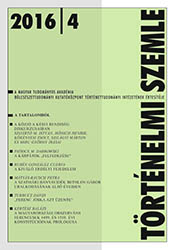 HE COMMON GOOD IN THE DISCOURSES OF THE LATE ANCIEN RÉGIME IN HUNGARY
HE COMMON GOOD IN THE DISCOURSES OF THE LATE ANCIEN RÉGIME IN HUNGARY
István M. Szijártó: The Concept of Common Good in Early Modern Political Discourse 499
Henrik Hőnich: “Public Happiness” and “Common Good”. On the Terminology of The True Patriot by Zsigmond Osvald 505
Zsolt Kökényesi: The Training of Useful Citizens. The Relations between Common Good and Education in the 18th-Century Habsburg Monarchy 519
Márton Szilágyi: The Common Good in György Bessenyei’s Novel Tariménes útazása (The Journey of Tarimenes) (1804) 533
György Miru: Moral Values and Divisible Goods in the Political Thinking of the “Reform Era” 541
STUDIES
Patrice M. Dabrowski: “Discovering” the Carpathians. Encounters between Lowlanders and Highlanders in the 19th Century 555
Rubén González Cuerva: “The prodigious Transylvanian prince”. The “long war” against the Ottoman Empire (1593–1606) in the Mirror of the relaciones de sucesos 565
WORKSHOP
Petra Mátyás-Rausch: The Mining Region of Szatmár in the First Years of Gábor Bethlen’s Rule (1613–1619) 585
Dávid Turbucz: “Francis Joseph Sent a Message”. Imperial Birth- and Namedays during World War I 603
Adrienn Kapitány: Traffi c-Related Proposals in the Commercial Elaborations of the National Committee of 1828–1830 615
DOCUMENTS
Balázs Kertész: The Prologue of the 1499 and 1518 Constitutions of the Observant Franciscans in Hungary 643
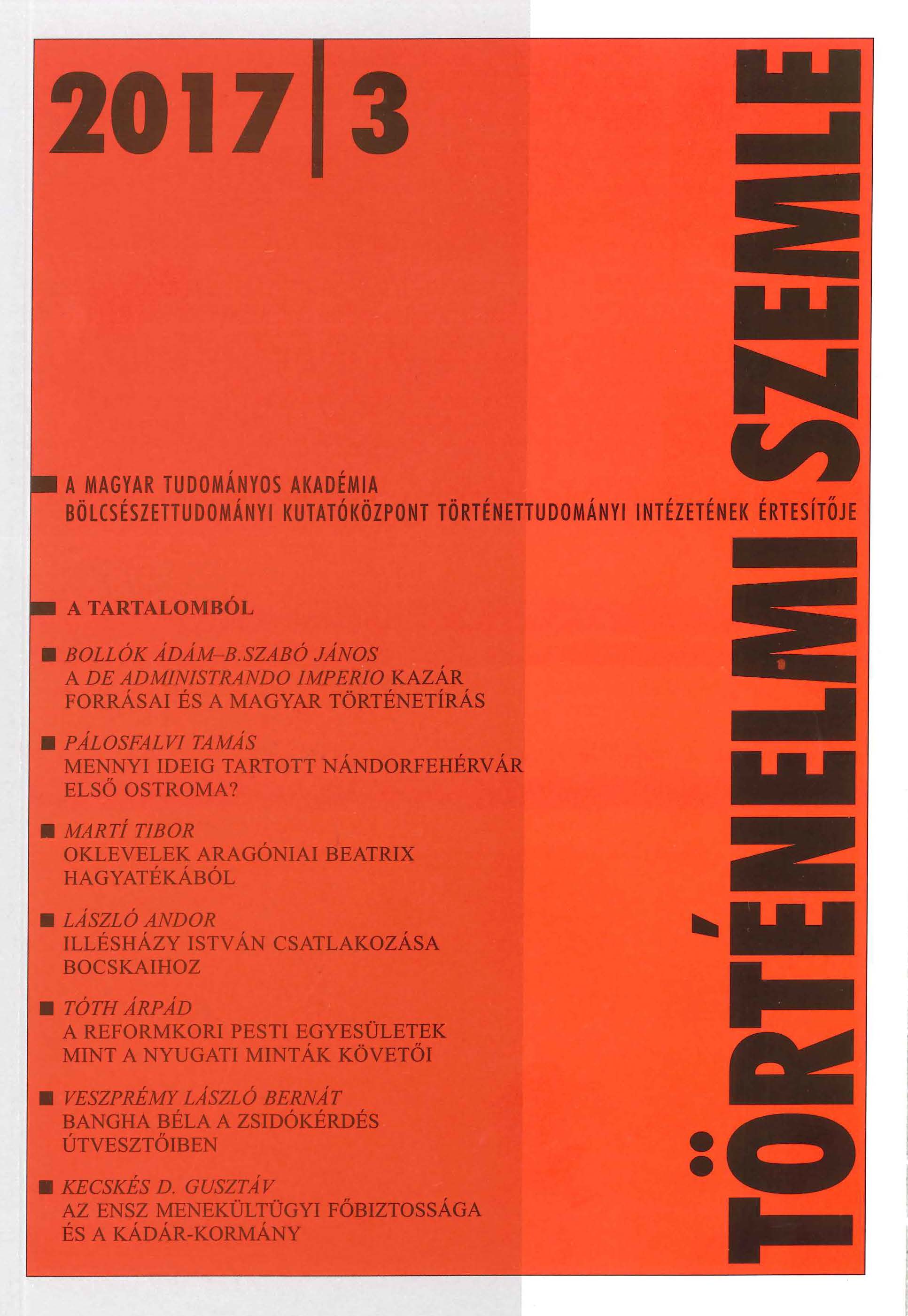 STUDIES
STUDIES
Ádám Bollók–János B. Szabó: How Did the Hypothesis on the Khazar Origin of the Information Preserved in Chapter 38 of De administrando imperio Disappear from Hungarian Historiography. A Historiographical Case Study 347
Andor László: Why István Illésházy Joined István Bocskai (1605) 379
Árpád Tóth: ’Aping’ or adaptation? The Pest voluntary societies of early 19th century as followers of Western patterns 399
DEBATE
Tamás Pálosfalvi: How Long Did the Siege of Belgrade Last in 1440?
Refl ections on an „extremely obscure” event 417
WORKSHOP
László Bernát Veszprémy: An Old-fashioned Jesuit anti-Judaist. Béla Bangha SJ in the Labyrinth of the Jewish Question 439
Gusztáv Kecskés D.: Relations between the Offi ce of the UN High Commissioner for Refugees (UNHCR) and the Kádár Administration during the Hungarian Refugee Crisis of 1956 463
DOCUMENTS
Tibor Martí: Unpublished Charters from the legacy of Beatrice of Naples 491
STUDIES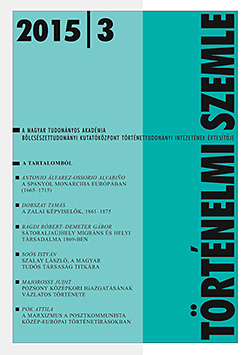
Antonio Álvarez-Ossorio Alvariño: Between Conservation and Succession: the Spanish Monarchy in Europe (1665–1715) 351
Tamás Dobszay: The MPs of Zala, 1861–1875 363
Róbert Bagdi–Gábor Demeter: The Characteristics of the Indigenous and Local Societies of Sátoraljaújhely Based on the Results of the Census in 1869 381
István Soós: László Szalay, Secretary of the Hungarian Scientifi c Society 411
WORKSHOP
Judit Majorossy: Sketching the Urban Administration of a Free Royal Town at the Border of the Kingdom of Hungary (Introduction to the “Archontology of Medieval Pressburg” in Process) 441
Attila Pók: Marxism in Post-Communist Central European Historical Writing 471
LIFE AT THE INSTITUTE 487
DEBATE 507
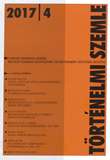 STUDIES
STUDIES
Levente Nagy: Martyr or Adventurer? Sava Branković and the Romanian Reformation in Transylvania during the Principality of Mihály Apafi I 525
Antal András Kováts: Swiss in the Flow of Hungarian History, 1867–1990 543
Attila Simon: The Three Occupations of Kassa. Parallels and Morals 569
Péter Apor: The Misery of Alternative Democracy. Ideology, Political Language and the Possibilities of Opposition in Hungary, 1968–1973 591
WORKSHOP
Balázs Sudár: On the Cultural Historical Background of the Hungarian Word Turul 605
Dániel Bácsatyai: King Andrew II’s Envoys in England 621
Péter E. Kovács: Hungarian Banners in Venetian Hands 633
István Kádas: Cum sigillo nostro. Seal Usage in Late Medieval Sáros County 637
Elek Szaszkó: The Registry of the Revenues and Expenses of the Sződi Manor from 1517/1518 (Contributions to the possessions of the Gersei Pető family in the southern region of the Great Hungarian Plain) 655
Barna Ábrahám: „With other nations like Saxons…” Interactions between Orthodoxy and Lutheranism in Transylvania in post-1867 Hungary 683
REVIEW ARTICLE 691
COMMEMORATION 699
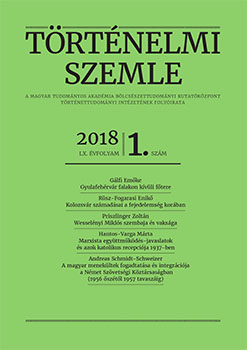 STUDIES
STUDIES
Emőke Gálfi The Main Square of Gyulafehérvár outside the Walls, and the Political Elite of the Town in the Late Sixteenth Century 3
Enikő Rüsz-Fogarasi The Kolozsvár/ Cluj Accountings and the Urban Administration in the Age of the Principality 17
Zoltán Priszlinger The Everydays of a Disease. The Eye Problem and Blindness of Miklós Wesselényi in the Light of His Diary 35
Márta Hantos-Varga Poisoned Pills? Marxist Collaboration Proposals and Their Reception by Catholics in 1937 69
WORKSHOP
Gábor Barabás Papal Chaplains in Thirteenth-Century Hungary. Commissions by the Holy See and Local Careers 97
Gyula Csaba Horváth Holders of the Ban’s Office in the Eighteenth Century 119
Balázs Füreder The Kitchen and Its Utensils of the Balassa Family from the Early Modern Era to the Middle of the Nineteenth Century 129
Andreas Schmidt-Schweizer „Preferential Treatment”. The Reception and Integration of Hungarian Refugees in the German Federal Republic (From Autumn 1956 to Spring 1957) 137
Review article 153
Commemoration 165
STUDIES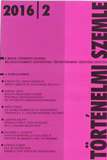
Pál Fodor–Szabolcs Varga: Miklós Zrínyi and Süleyman’s Death 181
Ákos Bartha: The Political Socialization of Endre Bajcsy-Zsilinszky and his Ideological Portrait prior to 1919 203
WORKSHOP
Tibor Szőcs: Whose Man? The Relationship between the Judge Royal and Vice-Judge Royal in the Second Part of the 13th Century 245
Bálint Lakatos: György Dózsa, Jean Hannart and the „Cegléd Manifesto”. Three New Sources on the Events of the 1514 Hungarian Peasant War 277
Krisztián Bodnár: „…Who Will Be Constrained by the Burden of Responsibility, Your Respectable Lordship Certainly Knows Well”. Lajos Kossuth
and the Collective Resignation of the Sátoraljaújhely Cholera Committee in 1831 303
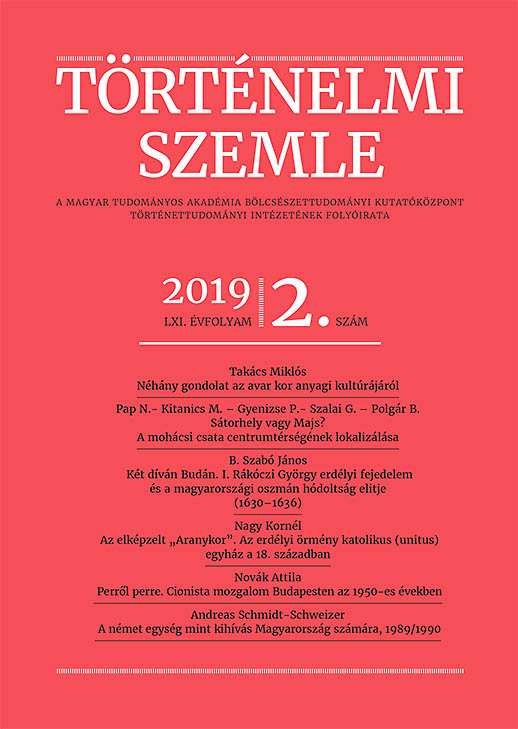 STUDIES
STUDIES
Miklós Takács Some Thoughts on the Material Culture of the Avar Period from the Perspective of a Settlement Archaeologist 165
Norbert Pap – Máté Kitanics – Péter Gyenizse – Gábor Szalai – Balázs Polgár Sátorhely Or Majs? The Environmental Features of Földvár – Localizing the Central Area of the Battle of Mohács 209
János B. Szabó Two divans in Buda. György Rákóczi I. and Elite of Ottoman Hungary (1630–1636) 247
Kornél Nagy Golden Age Imagined. The Armenian Catholic (Uniate) Church in Transylvania in the 18th Century 267
Attila Novák From Lawsuit to Lawsuit. Zionist Movement at Budapest in the 1950s 285
Andreas Schmidt-Schweizer Hungarian – West-German Relations in 1989/1990. The Unification of Germany as a Challenge for Hungary 311
WORKSHOP
István Kádas – Renáta Skorka – Boglárka Weisz Commercial Sources in the Service of Hungarian Medieval Economy 329
STUDIES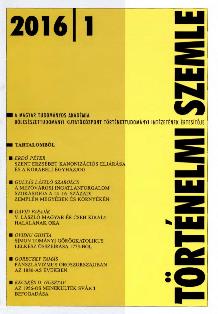
Péter Erdő: The Canonization Process of Saint Elisabeth and Contemporary Canon Law 1
László Szabolcs Gulyás: The Customary Law of Real Estate Trade in Market Towns in the 14th to 16th Centuries. The Case of Zemplén County and its Region 23
Tamás Goreczky: Pan-Slavism in Russia in the 1880s in the Reports of István Burián, Austro-Hungarian Consul General in Moscow 63
Gusztáv D. Kecskés: The Swiss Reception of Hungarian Refugees in 1956 85
WORKSHOP
David Papajík: Solving the Problem of Establishing the Cause of Death of Hungarian and Czech King Ladislav V 115
Ovidiu Ghitta: The Lessons of an Extraordinary Conscription. The Census Record of Şimon, Greek-Catholic Priest of Tomány, from 1773 127
József Pap: The Voters of Eger in the Middle of the 19th Century 149
Tibor Dömötörfi : German Ethnic and Racial Politics in Hungary during World War II 165
Page 4 of 14